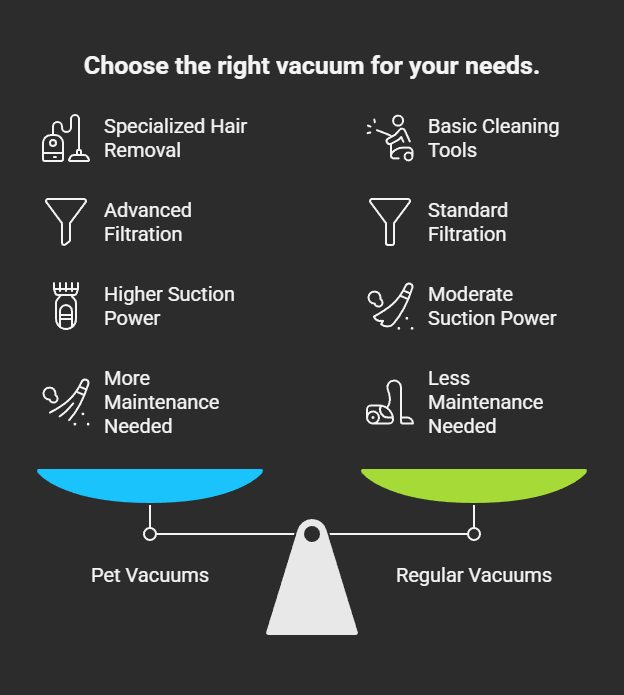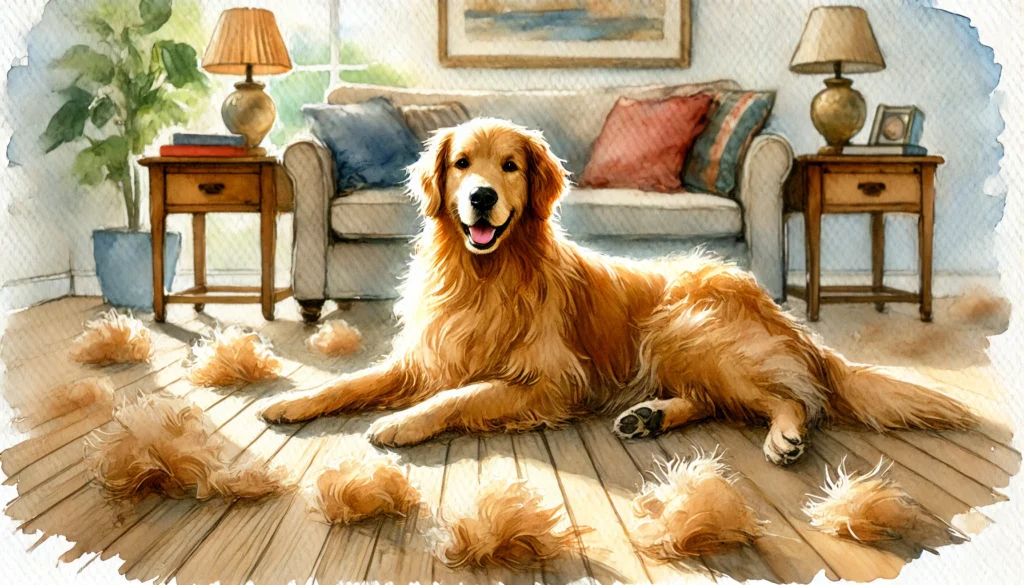You can generally use a pet vacuum as a regular vacuum, but there are noteworthy differences that might influence your choice depending on your cleaning needs.
A pet vacuum is perfectly capable of handling everyday dirt, dust, and debris. But the real difference lies in how it cleans and whether those specialized features make sense for your house.

What Sets Pet Vacuums Apart from Regular Vacuums?
1. Specialized Features for Pet Hair
Pet vacuums are purpose-built to deal with the clingy, wiry, or fluffy hair our pets leave behind. Unlike standard vacuums, they often come with motorized brush rolls and enhanced suction designed to lift strands from carpet fibers and upholstery. This extra muscle makes them particularly effective in homes where pet hair is a constant battle.
2. Attachments & Tools
One of the biggest differences is in the toolkit. Pet vacuums frequently include specialized nozzles, upholstery brushes, and crevice tools designed for hair removal in tight or awkward spaces. While a regular vacuum may come with a couple of generic attachments, the pet-specific arsenal makes a noticeable difference in efficiency when cleaning sofas, stairs, or pet beds.
3. Filtration Systems
Another area where pet vacuums stand out is filtration. Many models use HEPA or advanced carbon filters to trap fine particles like pet dander and allergens before they re-enter the air. For households with allergy sufferers, this feature alone can justify the upgrade. Standard vacuums, by contrast, usually rely on more basic filters that aren’t as effective at locking in microscopic irritants.
4. Suction Power & Efficiency
While regular vacuums are designed to tackle everyday dirt, pet vacuums are tuned for stubborn debris. Higher suction levels, paired with optimized brush designs, help them capture hair that would otherwise slip through the bristles of a standard model. In short: they don’t just clean, they overpower.
5. Maintenance Needs
All that power comes with a catch: pet vacuums tend to require more upkeep. Brush rolls and filters can clog faster with hair, and maintaining peak performance often means more frequent cleaning and filter replacements. A regular vacuum may demand less attention — but at the cost of performance in pet-heavy households.
Using a Pet Vacuum as a Regular Vacuum
Versatility
The beauty of a pet vacuum is that it isn’t limited to pet-related messes. These machines are fully capable of handling the everyday mix of dust, dirt, and crumbs that any home produces. In that sense, they function as all-purpose cleaners, not just niche gadgets. If you live with pets, a pet vacuum essentially serves as a two-in-one: it tackles stubborn hair while performing just as well on standard debris.
Cost Considerations
That versatility comes at a price. Pet vacuums usually cost more than their regular counterparts, thanks to upgraded motors, specialized brush rolls, and advanced filters. For households without pets — or with pets that shed very little — that extra spend may not deliver enough added value. In those cases, a regular vacuum can be the more sensible and budget-friendly option.
Efficiency in Different Homes
The real deciding factor comes down to household needs.
- Pet owners benefit from the stronger suction and hair-specific attachments, saving time and frustration.
- Allergy sufferers gain relief from the HEPA and carbon filtration systems that trap dander and dust particles.
- Non-pet households, on the other hand, may find that a regular vacuum covers all their cleaning bases without the higher price tag or additional maintenance requirements.
When Should You Choose a Pet Vacuum Over a Regular One?
Homes with Multiple Pets or Heavy Shedders

If your golden retriever sheds enough to knit a sweater every week or you share space with multiple cats, a standard vacuum will likely struggle. A pet vacuum’s specialized brush rolls and higher suction are designed for exactly this level of challenge.
Allergy-Prone Households
For anyone sensitive to dust, dander, or pollen, a pet vacuum’s HEPA-grade filtration system can make a noticeable difference in air quality. It doesn’t just clean the floors — it helps reduce airborne allergens that can trigger reactions.
Situations Where Specialized Tools Add Real Value
Think about furniture, car interiors, or stairs — all prime spots where pet hair loves to hide. The extra attachments that come with pet vacuums, like upholstery brushes and crevice tools, make it easier to target these areas. For homes where pets are on the furniture (or the car seats), those extras aren’t just nice-to-have; they’re game-changers.
When a Regular Vacuum Is Enough
Households Without Pets (or With Minimal Shedding)
If you don’t share your home with a furry friend — or you have a low-shedding breed — the extra horsepower of a pet vacuum may be overkill. A standard vacuum cleaner will handle everyday dust, crumbs, and dirt with ease, without the added cost of pet-focused features.
Budget-Conscious Buyers
Pet vacuums tend to sit at the higher end of the price spectrum. If budget is a key factor, a regular vacuum offers solid performance at a lower cost. For many households, that balance between affordability and practicality makes it the better buy.
General Cleaning Needs Without Allergen Concerns
If allergies aren’t an issue, there’s less need for advanced filtration. A regular vacuum’s basic filter is usually sufficient for maintaining clean floors and surfaces in a typical home environment.
Summary / Final Verdict
So, can you use a pet vacuum as a regular vacuum? Absolutely. Both clean standard dirt and debris, but pet vacuums bring extra muscle and specialized features that shine in homes with pets.
- Pet vacuums are more versatile, especially effective for tackling pet hair and reducing allergens.
- Regular vacuums are practical, reliable, and cost-effective for households without significant pet messes.
In the end, the smarter choice isn’t about labels — it’s about lifestyle. If your household battles pet hair and dander daily, a pet vacuum is worth the investment. If not, a well-built regular vacuum will serve you just fine.
Frequently Asked Questions
1. Can I use a pet vacuum if I don’t have pets?
Yes. Pet vacuums are versatile enough to handle dust, dirt, and crumbs even in homes without pets. However, you may end up paying for features you don’t actually need.
2. Are pet vacuums more powerful than regular vacuums?
Generally, yes. Pet vacuums are designed with stronger suction and motorized brush rolls to pull up stubborn pet hair, which also makes them highly effective on regular debris.
3. Do pet vacuums work better for allergy sufferers?
Absolutely. Many pet vacuums include HEPA or advanced filters that trap allergens like pet dander, pollen, and fine dust, making them a better choice for households with allergy concerns.
4. Is a pet vacuum worth the extra cost?
It depends. If you have pets that shed heavily or family members with allergies, the investment pays off in cleaner floors and better air quality. If you don’t, a regular vacuum usually suffices at a lower price point.
5. How often should I maintain a pet vacuum?
Pet vacuums require more frequent maintenance than regular models — expect to clean brush rolls and replace or wash filters more often to keep them performing at their best.